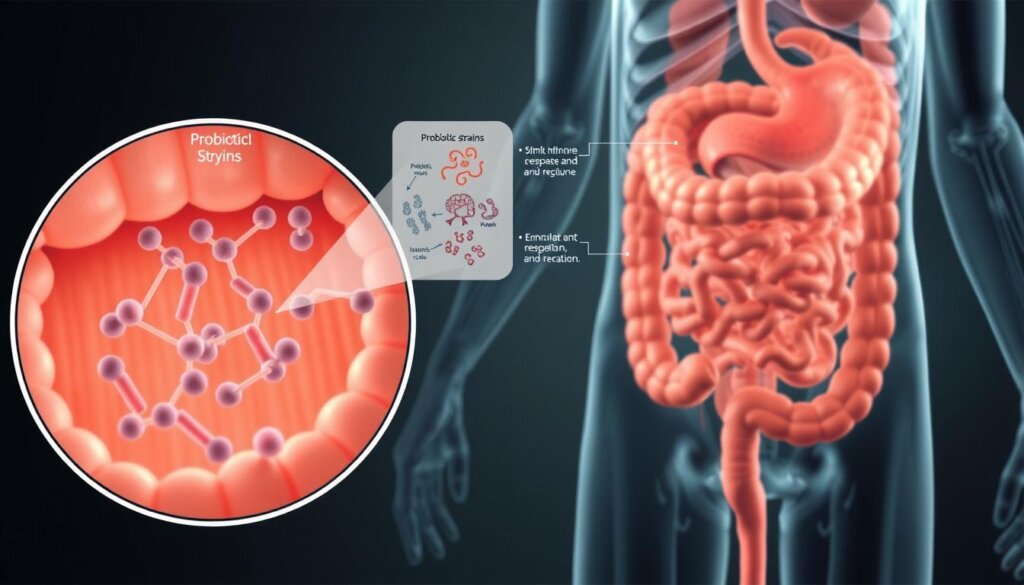Trillions of microorganisms call the human body home, working tirelessly to maintain balance and support vital functions. These microscopic allies play a surprising role in digestion, immunity, and even mood regulation. But what happens when you intentionally add more of these helpers through supplements or fermented foods?
Many individuals report shifts in their digestive patterns when introducing live microorganisms to their system. These changes vary widely—some experience smoother digestion within days, while others notice temporary adjustments as their body adapts. The specific strains consumed, existing gut flora composition, and personal health conditions all influence outcomes.
Research shows that 60% of adults in Southeast Asia actively manage their digestive wellness. For Malaysian residents curious about optimizing their internal ecosystem, understanding this process helps set realistic expectations. Those seeking personalized advice can contact Wellness Group at +60123822655 for guidance tailored to Malaysia’s unique dietary landscape.
Key Takeaways
- Digestive changes vary based on individual biology and probiotic strains
- Initial adjustments often signal gut flora rebalancing
- Fermented foods and supplements work differently for each person
- Monitoring changes helps identify what works best for your body
- Professional guidance ensures safe, effective probiotic use
While temporary stool changes typically indicate adaptation rather than concern, persistent issues warrant medical consultation. This guide breaks down the science behind microbial influences on digestion—empowering readers to navigate their gut health journey with confidence.
Understanding Probiotics and Digestive Health
Your digestive system houses a bustling community of microscopic allies working to keep you healthy. These tiny organisms form a complex network that impacts everything from nutrient absorption to how your body defends itself against threats.
What Are Probiotics?
Probiotics are live microorganisms that join forces with your existing gut residents. Common types like Lactobacillus acidophilus thrive in fermented foods, while Bifidobacterium longum specializes in immune system support. Each strain offers unique benefits, much like different tools in a wellness toolkit.
The Role of Gut Microbiota
Your intestinal bacteria act as both nutritionists and security guards. They break down food components your body can’t process alone and produce vitamins like B12. Research shows balanced microbiota may even influence mood through chemical signals sent to the brain.
Factors like antibiotic use or high-stress periods can disrupt this delicate ecosystem. This explains why many Malaysians turn to scientifically-backed microbial supplements to restore harmony. Choosing the right strains becomes key – some tackle digestive discomfort, while others focus on strengthening defenses.
Do Probiotics Affect Your Stool?
Introducing new microbial allies often sparks noticeable shifts in digestive patterns. These changes occur as fresh bacterial strains establish themselves in the intestinal environment, creating temporary ripples before harmony emerges.

How Gut Bacteria Influence Digestion
Beneficial microorganisms interact with food particles and existing flora through three key actions:
- Outcompeting harmful bacteria for nutrients
- Producing compounds that strengthen intestinal walls
- Regulating how quickly material moves through the system
These processes can temporarily increase gas production, explaining why some people experience bloating during initial use. Yeast-based varieties may cause different symptoms, like thirst or firmer stools.
What to Expect Initially
Most adjustments resolve within 2-4 weeks as the bowel adapts. Common temporary changes include:
- Softer or more frequent movements
- Mild constipation during strain transitions
- Reduced abdominal discomfort over time
Those noticing persistent digestive symptoms should consult healthcare professionals. Tracking changes helps identify which strains work best for your unique system.
Exploring Probiotic Supplements and Fermented Foods
Navigating the world of microbial support offers two primary options: precision-engineered probiotic supplements or traditional fermented foods. Each approach brings distinct advantages for digestive wellness.
Overview of Probiotic Supplements
Specially designed supplements deliver targeted bacterial strains in measured doses. Available as capsules, powders, or liquids, these products help address specific concerns like irregular digestion. Clinical studies often guide their formulations, making them ideal for those seeking predictable results.
Natural Sources: Fermented Foods
Traditional preservation methods create nutrient-rich options like kimchi and kefir. These fermented foods offer live cultures alongside vitamins and fiber. Always check labels for “active cultures” – heat processing sometimes removes beneficial bacteria.
| Feature | Supplements | Fermented Foods |
|---|---|---|
| Strain Specificity | Tailored combinations | Natural mixtures |
| Concentration | Higher CFU counts | Variable levels |
| Additional Nutrients | Limited | Fiber, vitamins |
| Local Availability | Health stores | Markets, supermarkets |
Many Malaysians combine both approaches – using supplements for consistency while enjoying tangy fermented foods as flavorful additions. This dual strategy helps maintain microbial diversity while addressing individual needs.
Popular local products include tempeh and budu, though modern types like kombucha are gaining traction. Remember: gradual introduction helps your system adapt to new food sources or supplemental forms.
Potential Side Effects and Health Benefits
Balancing microbial supplements requires understanding both temporary reactions and lasting advantages. While adjustments occur as new strains integrate with existing gut flora, research confirms significant wellness potential for those who persist through initial changes.

Common Digestive Side Effects
Many people notice mild reactions when first taking these supplements. Increased gas and bloating often signal microbial activity reshaping intestinal environments. Some experience temporary constipation or thirst, especially with formulas containing Saccharomyces boulardii yeast strains.
These effects usually fade within 3-4 weeks as the body adapts. A 2023 clinical review found 68% of users reported symptom improvement after consistent use. “Initial reactions frequently indicate successful colonization,” notes gastroenterologist Dr. Aminah Tan.
Evidence-Based Health Benefits
Regular use demonstrates measurable advantages beyond digestion. Studies link specific strains to 42% fewer respiratory infections and enhanced nutrient absorption. Research highlights particular benefits for managing IBS symptoms and antibiotic-related disruptions.
Emerging data suggests broader impacts, including:
- Strengthened gut barrier function
- Reduced inflammation markers
- Improved lactose processing
Malaysian health surveys show 74% of consistent users report better digestive comfort. For optimal results, pair quality supplements with fiber-rich local foods like ulam and asam boi.
Tips for Safe Probiotic Use and Dosage
Smart integration of microbial supplements into daily routines requires strategic planning. A phased approach helps maintain digestive comfort while maximizing potential benefits.
Starting with a Low Dose
Begin with 25-50% of the recommended dosage for the first 5-7 days. This allows your system to adapt without triggering intense reactions. Gradually increase the amount every 4 days until reaching the full serving size.
Common adjustment signs include mild bloating or temporary changes in bathroom habits. Tracking these in a journal helps identify patterns. For those managing constipation, certain strains may help soften stools when introduced slowly.
Consulting Healthcare Providers
Medical guidance becomes crucial if you:
- Experience symptoms lasting over 3 weeks
- Have existing digestive conditions
- Take immunosuppressants or antibiotics
Professionals can recommend specific strains that may help with issues like gas relief while avoiding incompatible formulas. A 2023 Malaysian health survey found 82% of users who sought advice reported better outcomes than self-prescribers.
Remember: Quality supplements work best when paired with personalized strategies. What stabilizes one person’s digestion might require adjustments for another. Regular check-ins ensure your approach stays aligned with evolving needs.
Guidance from Wellness Group
Navigating digestive wellness becomes smoother with trusted guidance tailored to local needs. Wellness Group’s team combines scientific knowledge with cultural awareness to help people across Malaysia optimize their health routines effectively.
Personalized Support for Local Lifestyles
Reach their experts at +60123822655 during business hours: Monday-Friday (9:30 am-6:30 pm) and Saturday (10 am-5 pm). They understand how Malaysia’s tropical climate and spice-rich cuisine influence gut health. Their consultations review dietary habits, existing conditions like bowel syndrome, and immune system needs.
Smart Integration Strategies
Their approach considers local food traditions when recommending prebiotics or microbial supplements. For instance, pairing specific strains with asam laksa or nasi lemak components enhances results. Regular reviews of your body’s responses help adjust plans over time.
Whether managing digestive concerns or boosting overall health, their team creates sustainable routines. This ensures people harness microbial benefits without disrupting Malaysia’s vibrant food culture. Book a consultation to explore solutions fitting your unique biology and lifestyle.
FAQ
Can taking supplements improve gut health?
Certain supplements containing live bacteria, like those found in products such as Culturelle or Align, may support digestive balance. Research suggests they help maintain healthy gut microbiota, which plays a role in digestion and immune function. However, results vary between individuals.
Do fermented foods offer similar benefits to supplements?
Yes! Foods like kimchi, kefir, or sauerkraut naturally contain beneficial bacteria. Brands like Lifeway Kefir or Bubbies Sauerkraut provide strains that may enhance gut diversity. These options are often cheaper and come with additional nutrients compared to pills.
What changes in bowel movements might occur initially?
Some people experience temporary bloating, gas, or softer stools as their body adjusts. For example, those using Bio-K+ or Renew Life products might notice these effects. Consistency typically stabilizes within a few weeks as the digestive system adapts.
Are there risks for those with weakened immune systems?
Individuals with conditions like HIV or undergoing chemotherapy should consult doctors before use. Certain strains in supplements, such as those in Garden of Life, could pose infection risks if immunity is compromised. Professional guidance ensures safer choices.
How long does it take to see improvements?
Most notice changes within 2–4 weeks, though factors like diet and stress influence outcomes. Brands like Florastor or Visbiome recommend consistent use for optimal results. Patience is key, as gut microbiota shifts gradually.
Can children or pregnant women use these products safely?
Some options, like Gerber Soothe Probiotic Drops, are designed for infants. Pregnant women should opt for strains studied for safety, such as those in Seeking Health’s Prenatal Probiotics. Always check labels and consult healthcare providers first.
What’s the best way to store probiotic-rich items?
Refrigeration preserves potency for many supplements, like Hyperbiotics Pro-15. Fermented foods, such as Farmhouse Culture Gut Shots, often require cooling after opening. Always follow storage instructions to maintain bacterial viability.






